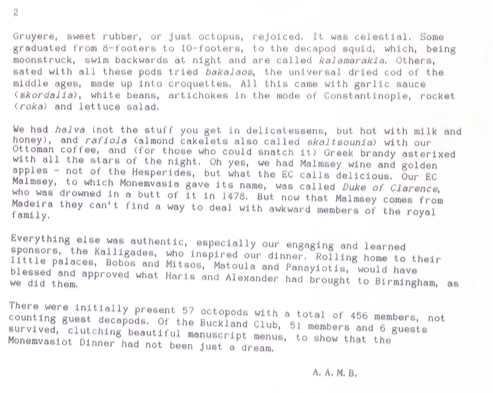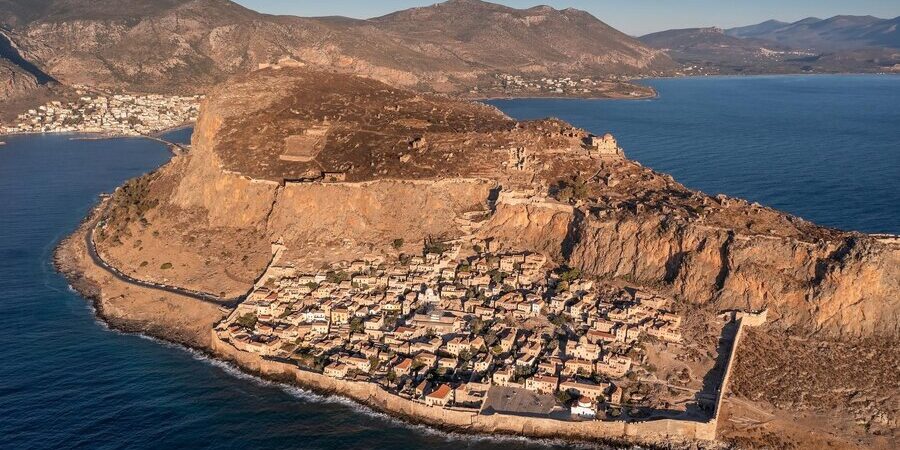Date: Wednesday 24th March 1992
Venue: Staff House, University of Birmingham
Sponsor: Alexander and Dr. Haris Kalligas
Menu
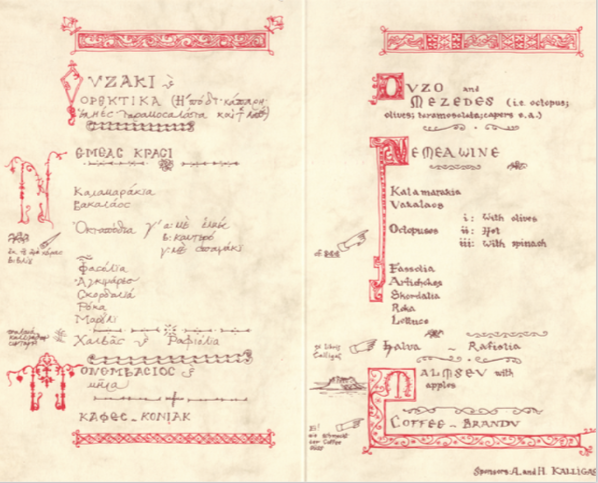
Monemvasiot Dinner Minutes
On Wednesday 24th of March 1992 the Club gathered at the University of Birmingham Staff House for a Monemvasiot Dinner. Member suspended belief. Monemvasiot is a great rock which hangs from the bottom right corner of the Greek Peloponnese by a fingernail of a causeway. We were shown photographs of the sort of Byzantine Gibraltar sheltering a walled town, which consists of one street, a square with a church which houses a wonder-working icon, the palace of Andronikos Palaiologos, one and a half tavernas and more history than you can digest. The main taverner is presided over by Matoula. Framed in her dark parlour is an honorary doctorate of the University of Birmingham. For Matoula is the surviving aunt of Yannis Ritsos a fiery poet of modern Greece who missed a Nobel Prize, but once sang for his doctorate and dinner in the room in which we sit tonight. Matoula is supplied by Mitsos, who, before the sun gets too high, scrambles through history, through the Ottoman fortress up to the abandoned Byzantine city above the Venetian town, to collect greenery and herbs. There is also Panayiotis who has a night boat and lands fish. Octopuses are free to all who can face their embraces underwater.
This is where Bobos’s half-taverna comes in. For a Greek, his place is unusual: a sort of reverse takeaway. He supplies the stove; you bring the octopus, swinging by its tendrils. At least, that was the scene before our chairman visited Monemvasiot last month. 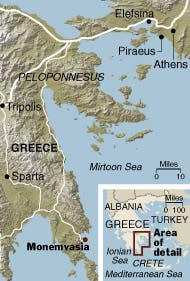
Thirty years ago the place was even quieter. Deceptively, it looked even more idyllic. But the fact then concealed depopulation and deep wounds among those who remained, reminiscent of places in western Ireland. Two young architects, our sponsors Haris and Alexander Kalligas, arrived and began making the Palaiologan palace habitable – all three rooms of it. Soon their family doubled the winter population of the place. Since then they have conserved and restored Monemvasiot with such sensitivity that they have been awarded a Europa Nostra prize for their work. Even better: the community revived.
Before breakfast Haris takes a trident. She emerges from the brine with an octopus – or eight. During breakfast, the globulous sound of octopods being flailed, with the traditional 99 slaps against a rock, make some people, who are tender enough at that time of day, a trifle queasy. Happily, Harris has found that a deep freezer is a more efficient way of tenderising her 8-footers. Open the freezer and cephalopods tumbled out, like Medusa heads.
After her London doctorate, which was on Monemvasiot, Dr Haris started taking her octopods equally seriously. She and Alexander presented members with their wonderful cookbook entitled 8 x 8 + 8 – eight ways of cooking octopus. They include Christmas pudding octopus, which no doubt members are even now stirring up. But we met in Lent, in Monemvasiot the eve of the Feast of Annunciation, which is Greek National Day – a break in Lent. Here the first crunchy grilled tendrils of octopus came with ouzo, among the mezes. Then three different octopus recipes arrived. They were cooked with Morean olives, with spinach, and with the black wine of Nemea which accompanied them.
![]()
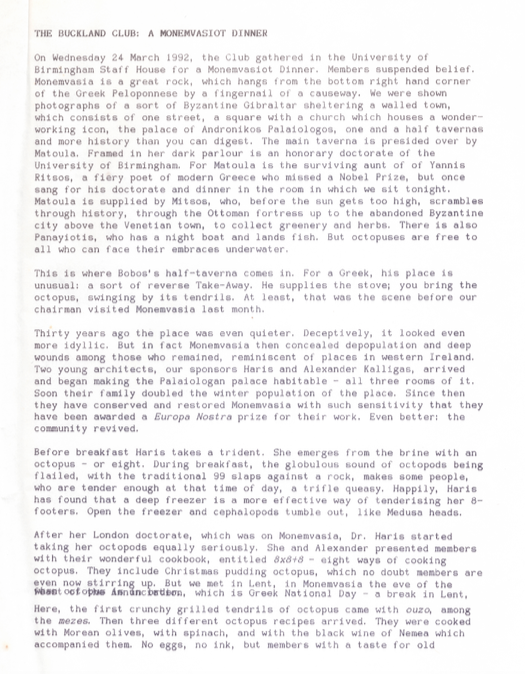
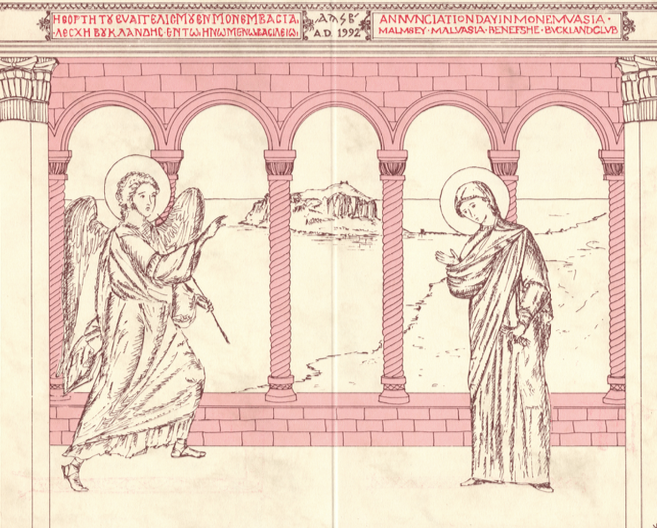
No eggs, no ink, but members with a taste for old Gruyere, sweet rubber, or just octopus, rejoiced. It was celestial. Some graduated from 8-footers to 10-footers, to the decapod squid, which, being moonstruck, swan backwards at night and are called kalamarakia. Others, sated with all these pods tried bakalaos the universal dried cod of the Middle Ages, made-up into croquettes. All this came with garlic sauce (skordalia), white beans, artichokes in the mode of Constantinople rocket (roka) and lettuce salad.
We had halva (not the stuff you get in delicatessens but hot with milk and honey), and rafiola (almond cakelets also called skaltsounia) with our Ottoman coffee, and (for those who could snatch it) Greek Brandy astrixed with all the stars of the night. Oh yes, we had Malmsey wine and golden apples – not of the Hesperides, but what the EC calls delicious. Our EC Malmsey, to which Monemvasiot gave its name was called Duke of Clarence who was drowned in a butt of it in 1478. But now that Malmsey comes from a Madeira they can’t find a way to deal with awkward members of the royal family.
Everything else was authentic, especially our engaging and learned sponsors, the Kalligades who inspired our dinner. Rolling home to their little palaces, Bobos and Mitos, Matoula and Panayiotis, would have blessed and approved what Haris and Alexander had brought to Birmingham as we did them.
They were initially present 57 octopods with a total of 456 members, not counting guest decapods. Of the Buckland Club, 51 members and six guests survived, clutching beautiful manuscript menus, to show that the Monemvasiot Dinner had not been just a dream.
A.A.M.B.
